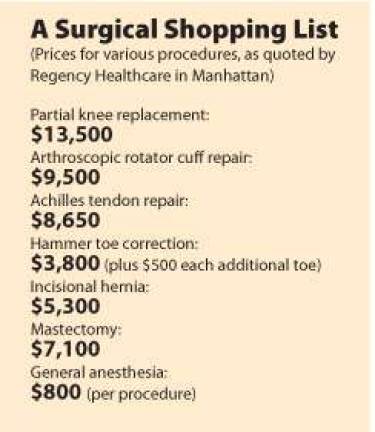How Much Would You Pay For A New Knee?

Upper East Side surgeon is among the first to offer "a la carte" medical pricing
Imagine if you could walk into your surgeon's office and price-shop the same way you do now for sweaters.
Upper East Side orthopedic surgeon Dr. Robert Haar is among the nation's pioneers in the use of "a la carte" pricing in healthcare, allowing patients to get an exact quote on a procedure without having to worry about hidden fees or doing the insurance company dance.
Harr, one of a handful of transparent-pricing doctors around the country, lists the prices of his services on the website of his practice, Regency Healthcare. At Regency, for instance, the price of an arthroscopic knee procedure is listed for a flat rate of $4,950, all costs included, while, his website notes, a hospital might provide the same service for up to $40,700. In general, however, he acknowledges that it's tough to draw such price comparisons, since there is no standard fee for hospital procedures, which can vary greatly.
Dr. Haar believes the target demographic for this model includes people without insurance who would prefer to pay for "what [they] need and receive" and not all the premiums and large deductibles that accompany insurance plans.
"People should have the option of paying out of pocket," he adds.
The doctor says even with the healthcare reform kicking in in January, millions of people will remain uninsured, whether by choice or an inability to find a desirable policy. His business will provide an alternative to Obamacare by providing direct access to common procedures.
Dr. Haar believes many people will willingly pay the penalty for being uninsured while partaking in concierge medicine.
Dr. Josh Umbehr of AtlasMD, a direct primary care practice in Wichita, Kansas, who also offers transparent pricing, says this system will benefit the uninsured, who often need discounts on medical care the most. He's also appealing to very small businesses, which won't have to cut their work staff just to afford healthcare.
"For businesses," he says, "they will still be administering self-funded plans to their employees and this cost savings model will still apply to them."
Dr. Haar is convinced his approach will catch on. "It's good for everybody," he said. "It's good for doctors who don't have to collect insurance claims, it's good for patients who can contact doctors directly."
Said Matt Jacobson of SignatureMD, a provider of concierge medicine all over the U.S., "For most patients who embrace [concierge medicine], it's difficult to put a price tag on their good health. But industry studies show that patients in a concierge program have substantially less hospitalizations than their counterparts receiving conventional medical care."